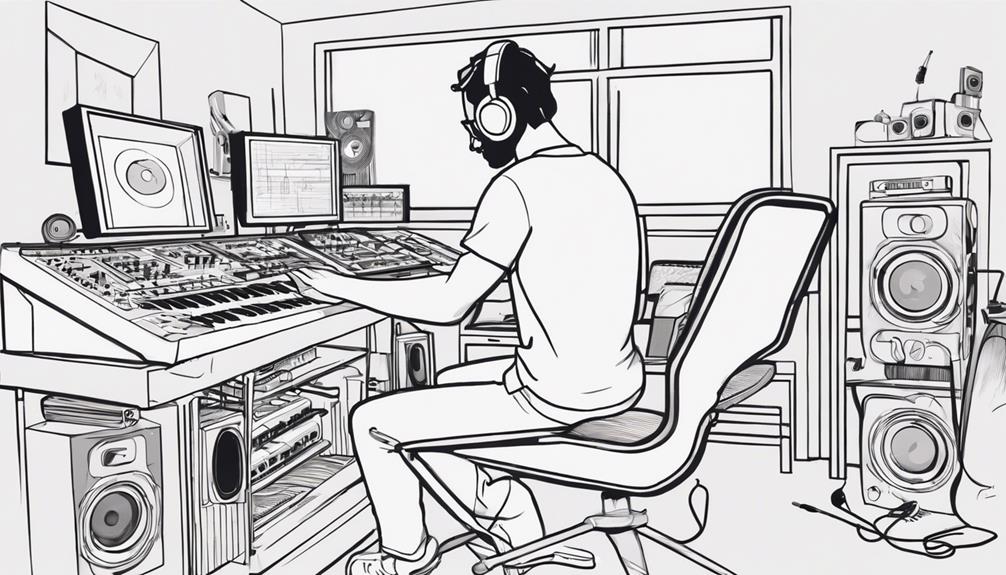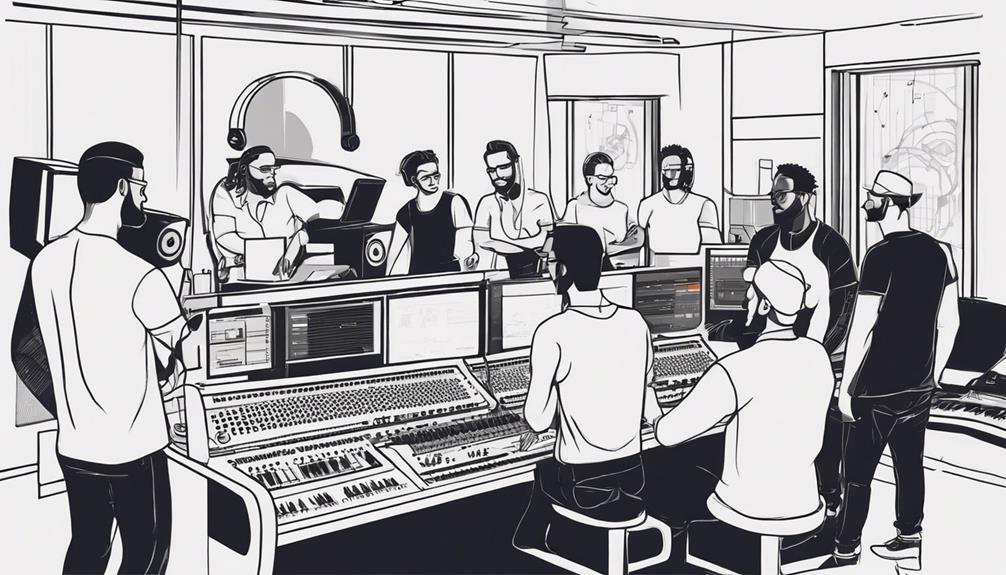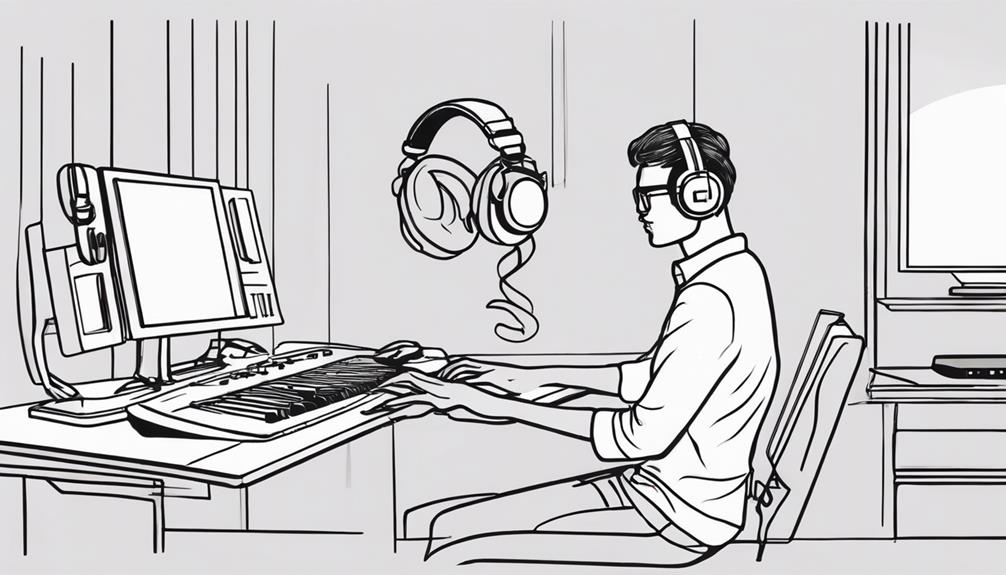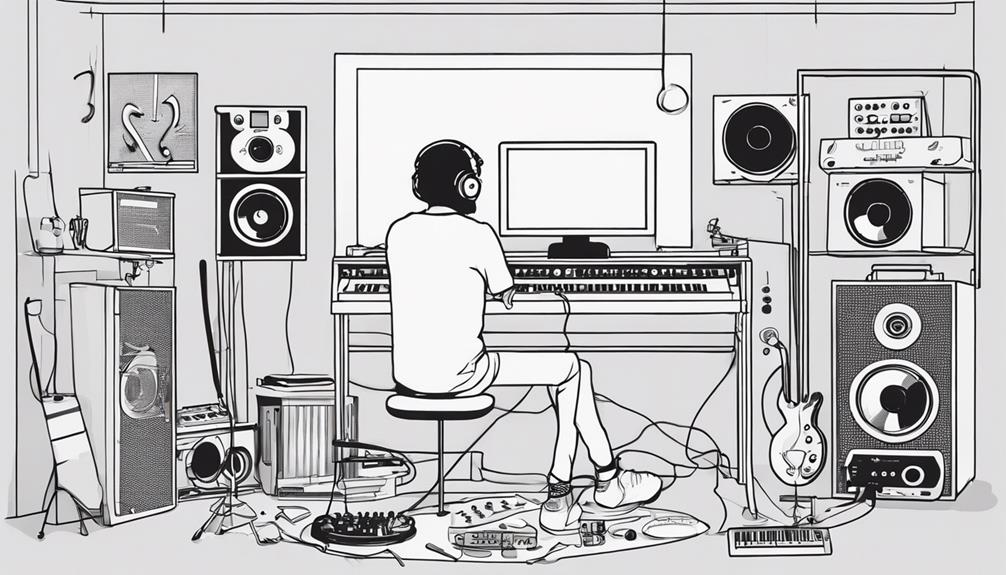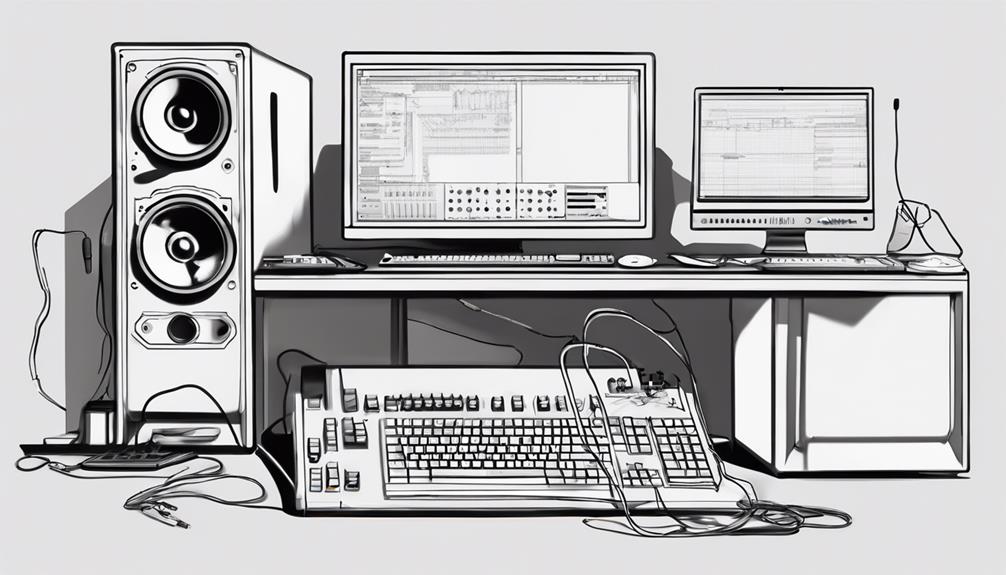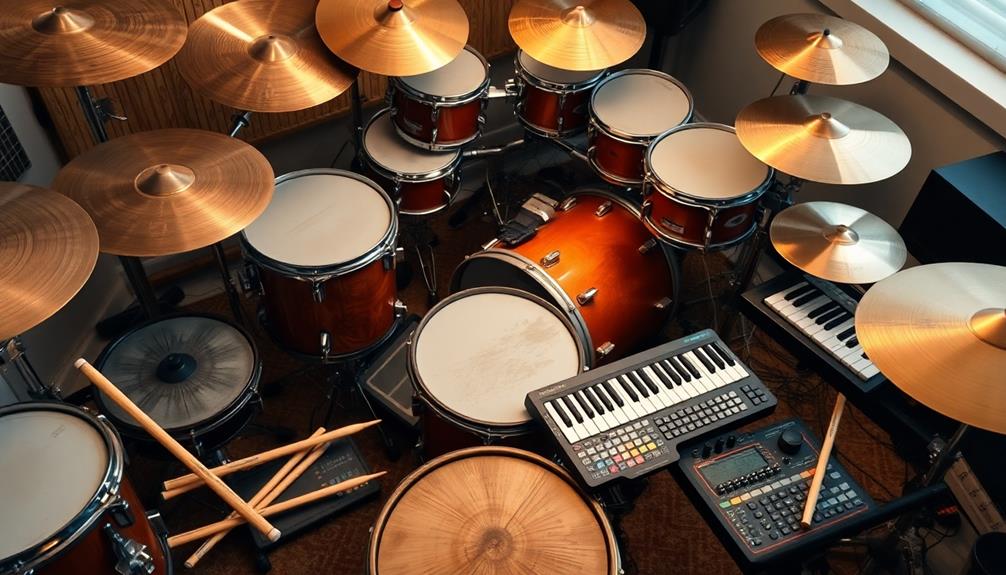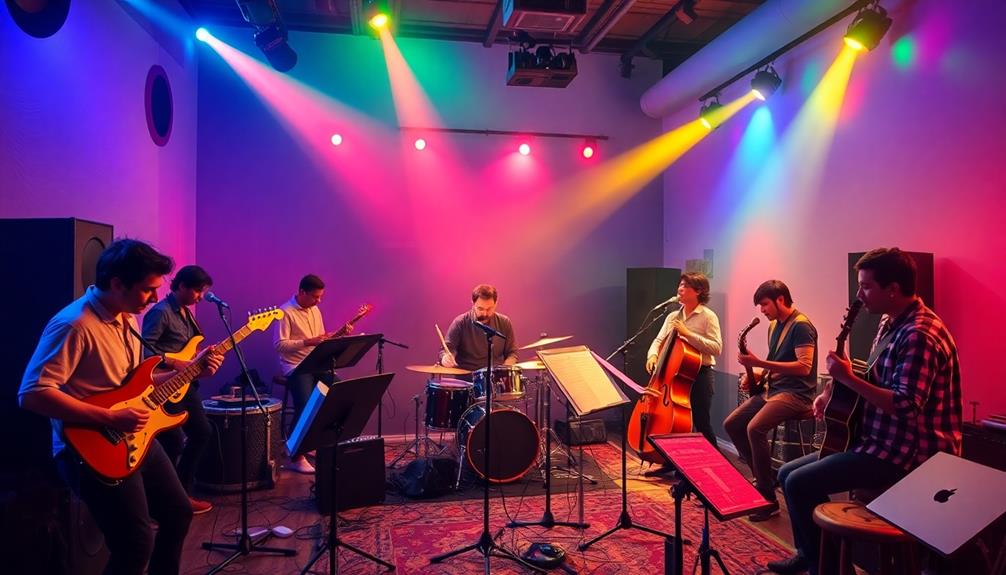To start your journey as a music producer, enroll in online music production courses. Learn music theory, DAW mastering, and audio production techniques. Engage with professionals at places like ICON Collective for valuable experience in a studio. Focus on skills like composition, mastering software, and mixing. Get hands-on by working on projects actively, attending workshops, and seeking internships. Develop a unique brand identity and engage with your audience through social media. Collaborate with artists, refine songs, and shape the final product. Acquire essential tools like DAWs, MIDI controllers, and studio monitors. Create engaging music and bring your creative visions to life!
Key Takeaways
- Enroll in online music production courses for theoretical and practical knowledge.
- Focus on music theory, composition, and mastering DAW software.
- Gain experience through internships, workshops, and active music projects.
- Develop a unique brand identity across social media and music releases.
- Collaborate closely with artists, refine songs, and shape the final music product.
Education and Training
Curious about how to kickstart your journey as a music producer?
The first step towards becoming a music producer is investing in your education and training. Online music production courses offer a convenient way to learn essential skills such as music theory, mastering digital audio workstations (DAWs), and audio production techniques.
Institutions like ICON Collective provide structured curriculums that cover a wide range of topics including beatmaking, mixing, and mastering. By enrolling in these courses, you not only gain theoretical knowledge but also practical experience in a professional studio setting.
ICON Collective stands out for its industry-leading professionals who teach these courses and offer valuable mentorship. The state-of-the-art facilities at ICON Collective further enhance the learning experience, providing hands-on training in audio engineering and music production.
Graduates from institutions like ICON Collective often find success in various roles within the music industry, showcasing the efficacy of the program through their achievements. By investing in education and training, you lay a solid foundation for your journey towards becoming a successful music producer.
Building Your Skill Set
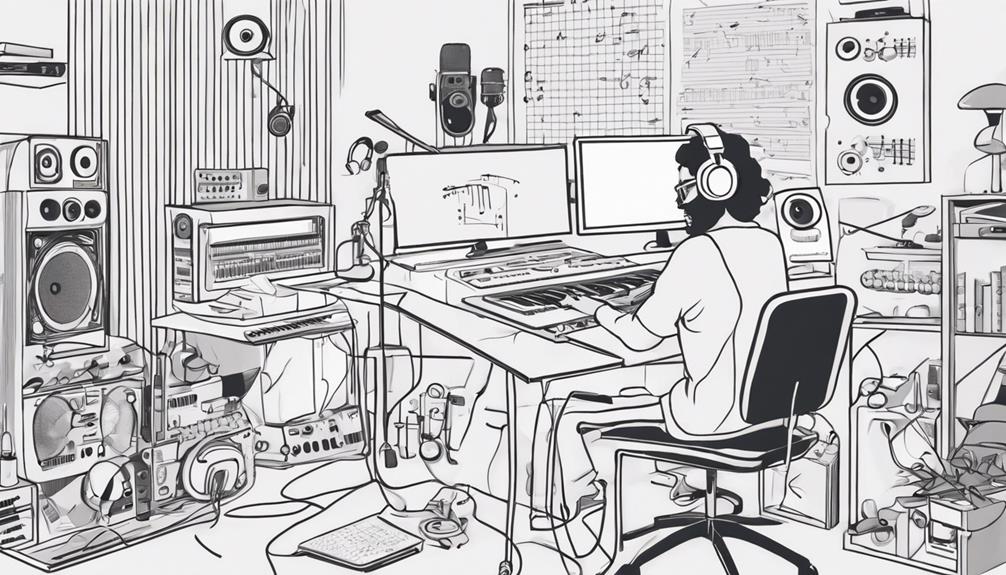
To excel as a music producer, you must focus on building a diverse skill set encompassing music theory, composition, instrument playing, proficiency in music production software, sound synthesis, mixing, mastering, and genre analysis.
Start by strengthening your understanding of music theory and composition to create compelling melodies and harmonies. Develop your instrument playing skills to add live elements to your productions and enhance your musicality.
Mastering music production software such as Ableton Live and Logic Pro is essential for efficiently arranging and composing tracks. Explore sound synthesis techniques to craft unique sounds and textures, and learn mixing and mastering to polish your tracks to a professional standard.
Analyzing different genres and production techniques will broaden your musical horizons and help you develop a versatile style.
Familiarize yourself with digital audio workstations (DAWs), plugins, and effects to effectively utilize them in your music projects. By honing these skills, you'll be well-equipped to create high-quality music productions across various genres.
Gaining Practical Experience
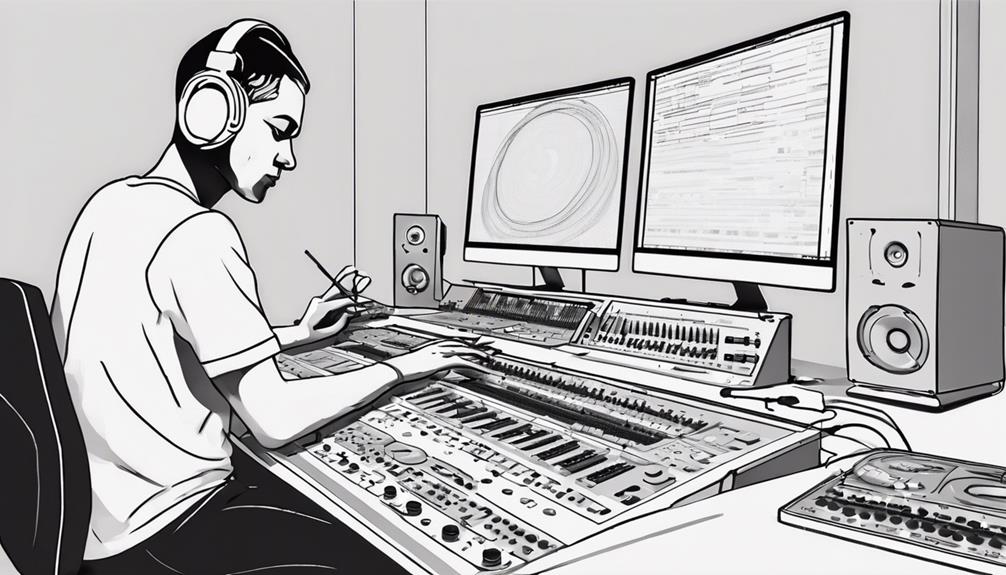
Gain practical experience in music production by actively working on projects and seeking opportunities to learn and collaborate with others in the industry. Engaging in music production projects, attending workshops, seminars, and industry events, and connecting with experienced music producers are essential steps to enhance your skills. Consider seeking internships or positions at recording studios or production companies to gain hands-on experience. Experimenting with various music genres and production techniques will help you expand your knowledge and abilities. Additionally, utilize online platforms to showcase your work, receive feedback, and network with other music producers.
| Opportunities | Description |
|---|---|
| Workshops | Attend these events to learn new production techniques and network. |
| Internships | Gain hands-on experience by working at recording studios or production companies. |
| Online Platforms | Showcase your work, receive feedback, and connect with other music producers. |
| Industry Events | Participate in seminars and events to network and learn from experienced professionals. |
Establishing Your Brand
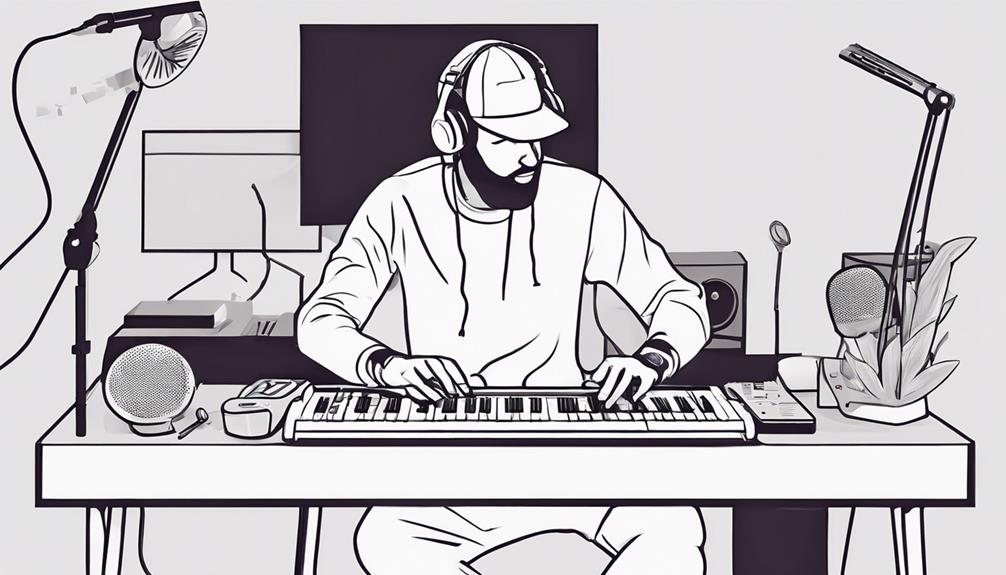
Establishing a unique identity that sets you apart in the music production industry is essential when building your brand. As a music producer, creating a consistent brand across various platforms such as social media, your website, and music releases is vital for brand recognition.
Develop a logo, color scheme, and visual style that resonate with your music and audience to enhance brand cohesion and professionalism.
Engage with your audience through regular content, behind-the-scenes insights, and collaborations with other artists to strengthen your brand presence. Networking with fellow music professionals, seeking collaborations, and actively showcasing your work can help expand your reach and establish credibility as a music producer.
What Is A Music Producer?
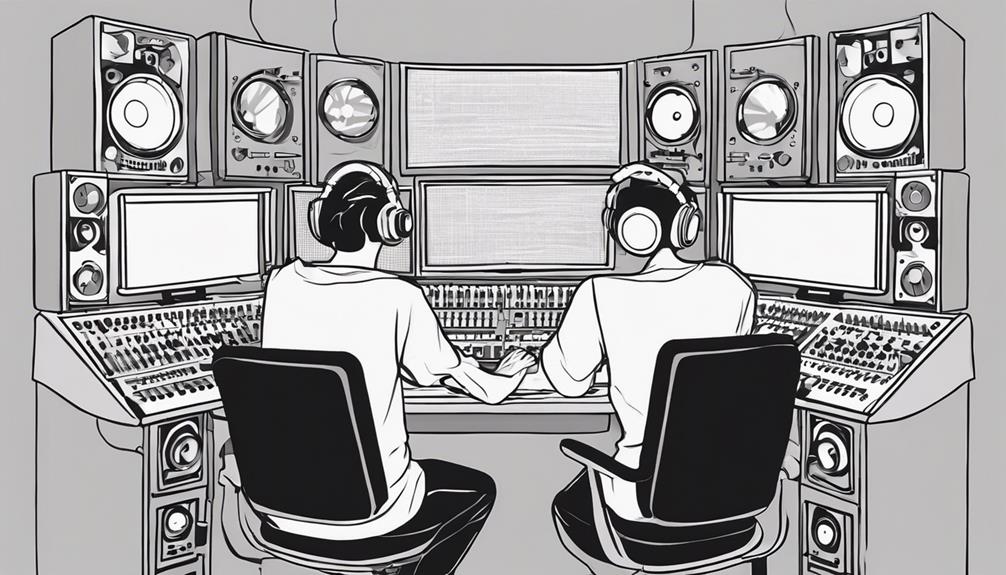
So, what exactly is a music producer?
A music producer is the mastermind behind the scenes who brings together all the elements of a music project, from songwriting to final production.
Collaboration is key for a music producer, working closely with artists, songwriters, and engineers to create a cohesive and high-quality piece of music.
Role of Producer
A music producer is an essential figure in the music industry who oversees the creative and technical aspects of music production. This includes tasks such as songwriting, sound design, mixing, and mastering.
Collaborating with musicians and other professionals is a vital part of a music producer's role, ensuring that all elements of a recording project come together seamlessly. Music producers, also known as record producers or executive producers, play a pivotal role in creating engaging and high-quality music pieces across various genres.
They're instrumental in bringing the vision of a recording project to life, working closely with artists to achieve the desired sound and feel. Whether it's shaping the overall direction of a song, perfecting the mix, or refining the final master, a music producer's expertise is essential for delivering a polished final product that resonates with audiences.
Skills Required
To excel as a music producer, you must possess a range of skills that encompass music theory, technical proficiency in using a Digital Audio Workstation (DAW), creativity, and effective collaboration abilities. Here are essential skills needed:
- Music Theory: Understanding musical concepts, scales, chords, and arrangements is vital for creating harmonious compositions.
- Technical Proficiency: Mastering a Digital Audio Workstation (DAW) is essential for recording, editing, and producing music effectively.
- Creativity: Being able to think outside the box, experiment with different sounds, and innovate to produce unique and engaging music.
- Collaboration: Working well with artists, engineers, and other professionals to bring diverse skills together and create cohesive music pieces.
Having a strong foundation in these skills won't only help you succeed as a music producer but also enable you to craft exceptional music across various genres and styles.
Collaborations in Music
Music producers, essential figures in the music industry, play a crucial role in collaborating with artists, songwriters, and engineers to bring music projects to life.
Through collaborations, producers can merge diverse talents and perspectives, enhancing the quality and creativity of music production.
Working closely with recording artists, producers provide guidance and expertise to achieve the desired sound and vision for the project.
Building a network of collaborators is essential for producers to access a variety of skills and resources necessary for successful music projects.
By fostering these collaborations, music producers can tap into a pool of creativity and expertise, ultimately elevating the overall production value.
This interconnected web of professionals not only enriches the music production process but also opens up opportunities for innovation and growth within the industry.
As a music producer, nurturing these collaborative relationships is crucial to maximizing the full potential of your music projects.
Means of Production
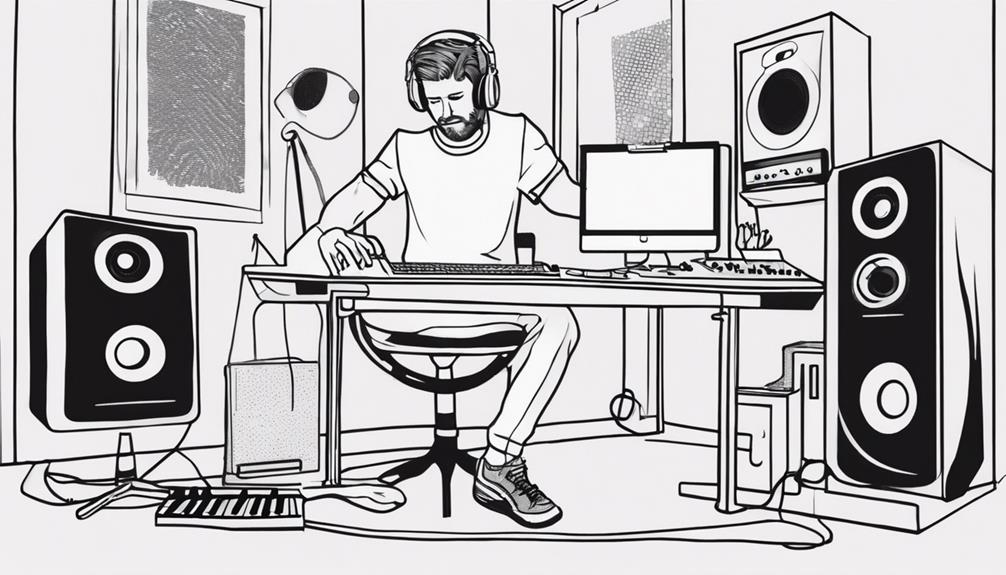
Exploring the means of production in music involves understanding the tools, software, and equipment essential for creating tracks. In today's music production landscape, music producers often rely on a combination of hardware and software to bring their creative visions to life.
Here are some key elements of the means of production:
- Digital Audio Workstations (DAWs): These software platforms serve as the central hub for recording, editing, and mixing music tracks.
- MIDI controllers: Used to manipulate virtual instruments and trigger sounds within a DAW, enhancing the hands-on creative process.
- Studio monitors: Essential for accurately hearing and mixing music, providing a clear representation of sound.
- Sound libraries: Pre-recorded samples and loops that producers can use to enhance their tracks quickly.
Frequently Asked Questions
How to Start a Career as a Music Producer?
To start a career as a music producer, begin with learning music theory, mastering a DAW, and honing sound design skills. Gain experience through practice and collaborations, network with professionals, and stay updated on industry trends.
What Is the Fastest Way to Become a Music Producer?
You want to become a music producer fast? Learn music theory, master a DAW, and practice consistently. Take online courses, build a home studio, collaborate with musicians, network, stay updated, experiment, and seek feedback.
Is It Too Late to Become a Music Producer?
It's never too late to become a music producer. Dedication and effort are fundamental, regardless of your age. Enjoy the journey of learning music theory and production techniques; your individual learning speed determines how quickly you progress.
Is It Hard to Become a Music Producer?
Becoming a music producer isn't easy, but it's possible. Dedication and passion fuel your journey. Embrace challenges as stepping stones. Stay updated, keep learning, and let your love for music drive you forward. Networking plays a crucial role in your career, so connect with artists, producers, and industry professionals to expand your opportunities. To truly understand how to become a music producer, immerse yourself in hands-on experience by experimenting with different sounds and mastering production software. Remember, every step you take brings you closer to your dream.
Conclusion
Now that you have the tools and knowledge to become a music producer, it's time to take the first step towards your dream.
Remember, Rome wasn't built in a day, so be patient with yourself and keep working hard.
The music industry is waiting for your unique sound to make its mark.
So grab your headphones, turn up the volume, and let your creativity soar like a soaring eagle in the sky!

